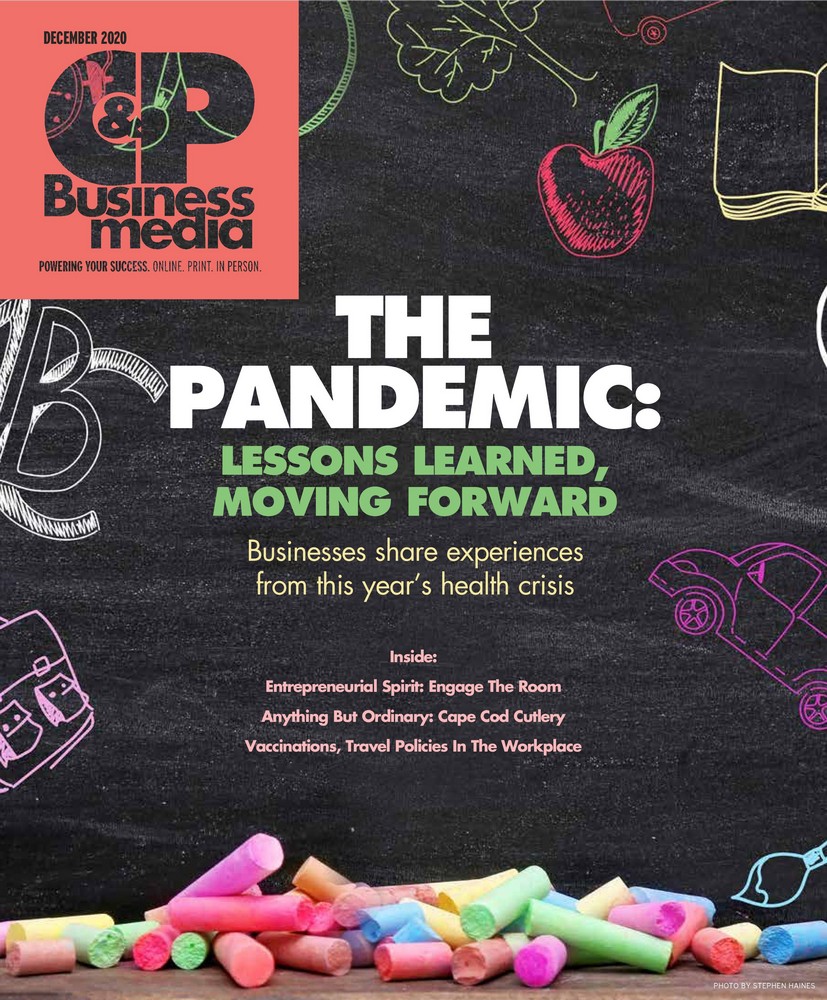What a year it has been.
It was no surprise to hear that Webster’s Dictionary proclaimed “pandemic” as the Word of the Year for 2020. COVID-19 had a profound effect on our lives and especially the business world and it’s not over yet. We asked several companies how they made it through and what their plans are, going forward as we turn the page on 2020 and look forward with hope to 2021.
SHEPLEY WOOD PRODUCTS, Hyannis
Tony Shepley, CEO and president
How did Shepley adapt to the pandemic?
Virtually overnight, we relocated half our office staff to remote operation, working from home. We worked out ways to be able to allow safe customer access to our facilities and a system of protocols that we have retained and refined to ensure customer and employee safety. We started bringing in lunch for all employees to minimize outside contact and we paid for all lunches for the next six months. We were very early adopters of plexiglass partitioning and we brought on a full time cleaner in our main branch in Hyannis to sanitize all surfaces daily or more frequently as needed. We had to send helpers out on deliveries in chase vehicles so as not to put two people together in a truck cab. Most importantly, we had to help people feel safe.
Did your business lay off personnel or cut services?
We kept everyone employed and cut no services. It was very important to us to keep our customers supplied and able to operate. Construction is a crucial element of our local economy.
What is the status of the business as of now?
We have experienced one of the most challenging years of our 42-year history but have been impressed by the dedication with which our staff has pitched in and also faced the unknowns of COVID-19 and all that surrounds it. We are strong, we are wiser and battle tested and we are committed.
Did anything positive to come out of this dire time? Something that surprised you about the human spirit, your employees?
Watching our people on the front lines figure out how to deal with fear and uncertainty has been inspiring. Witnessing the inspiration that can come from catastrophe has been uplifting. Seeing how people pitch in and do selfless good work for others has helped show the good that can come from adversity.
Lessons learned; how you are moving forward:
This too, like all else shall pass. It always does and it always will. Faith, courage, and tenacity are a powerful antidote for any problem we face. Challenges are always the greatest teachers.
We must be ready for what comes, and no amount of worry makes things better. We are moving forward with focus, with preparedness and with dedication. 250,000 people should not die for nothing.
THE WEST END, Hyannis
Jen Villa and Blane Toedt, Owners
How did your restaurant adapt to the pandemic?
We created a new takeout menu, invested in takeout packaging and launched a new online ordering system. As a restaurant with no existing outdoor dining, we acted quickly and rented a large tent and set up tables in the parking lot while we simultaneously began to plan and design a permanent outdoor patio. By early July we opened our “Garden Terrace” adding nearly 100 seats outside with new outdoor furniture, propane heaters, patio landscaping and a tent. We invested tens of thousands of dollars to create new systems and new spaces just to make our business viable. If we hadn’t adapted in these ways we wouldn’t have been able to generate any revenue.
Did your business lay off personnel or cut services?
We initially had to lay off our entire staff when the pandemic first hit, when we reopened the restaurant to the public we re-hired a much smaller staff than past seasons.
What is the status of the business as of now?
We are currently open for indoor dining and offering takeout with a limited schedule Thursday-Saturday 5 to 9 p.m. and Sunday Brunch 11 a.m. to 2 p.m.
Did anything positive come out of this dire time?
Yes! We are located next to the Cape Cod Melody Tent which brings in hundreds of guests nearly every night in the summer, which is great for business but creates a very busy environment at the restaurant. This summer we had no shows, which was bad for revenue but good for our local customers who were able to enjoy a more relaxed dining experience. These locals turned into regulars and we were able to build an incredible rapport with them. We now have a beautiful outdoor patio! As a restaurant with over 200 seats inside, this is something we probably would have never invested in. We were able to focus on our staff, steps of service and our guests in a way the normal busy summer season doesn’t necessarily allow.
Lessons learned; how you are moving forward.
We are truly taking it day by day. It has been extremely difficult to predict customer behavior and manage spending with so many unknowns. We have been trying to think creatively and strategically to keep our business relevant, all while prioritizing the safety of our staff and community.
The pandemic has been a financial nightmare for most small businesses, especially for a restaurant like The West End. But we have worked so incredible hard as a team and face every day with an open mind and a willingness to adapt. We are so looking forward to getting on the other side and feel like if (when) we make it through this, we will be stronger and more successful than ever!
CATANIA HOSPITALITY GROUP, Hyannis
Bill Catania, CEO & President
How did your business adapt to the pandemic?
We decided to stay open even if business levels did not justify it as we wanted to be a stable place for our employees and customers. We cut expenses, adapted to new customer needs.
Did your business lay off personnel or cut services?
We had to furlough staff but have offered jobs back to all of them.
What is the status of the business as of now?
We have adapted well and we are stable and looking forward to next summer.
Lessons learned; how you are moving forward.
Be able to pivot quickly, positively and intellectually.
SOUTH SHORE CHAMBER OF COMMERCE
Peter Forman, CEO, Executive Director
Generally, we have seen resolve and resilience from our members. Most small businesses made the determination early on that they would get through this year. They have done it broadly by streamlining operations or finding ways to reposition their business to find some new markets or customers. Next year could be tougher for some as financial cushions are thinner, economy reopens and they need to scale back up or changing habits force different changes in business models.
One positive outcome has been unlocking the entrepreneurship that can often be lost when plans generally go along smoothly for a long period. Necessity forced re-examination and creativity. This will likely lead to entirely new businesses in some cases and stronger businesses in others. That could lead to a stronger economy coming out of this than we had going in.
ROGERSGRAY, Cape Cod/South Shore
Lynn Mason-Small, Chief Marketing Officer
How did RogersGray adapt to the pandemic?
Because of our industry (insurance), we already had protocols in place to operate remotely if needed (for instance in the case of a hurricane, we would still be able to serve clients). Within a week, we had all of our employees working remotely with little to no interruption to client service. We were very mindful however, of the impact to our employees – especially those with young children and immediately took steps to keep our teams connected, informed and engaged during the first months of the pandemic. Much of what we implemented then still remains in place to keep our team connected – even if it’s virtual.
Did your business lay off personnel or cut services?
We did not – although ensuring staffing was at full capacity was a challenge because the numbers of employees with children is high within our agency. It’s was a juggling act those first few months for sure – our business and employee benefits clients were struggling and needed us to help guide them through employment practice changes/updates, make changes to policies, etc.…and we needed to be there for them.
What is the status of the business as of now?
Because we were able to mobilize our team so quickly, our operation has stayed intact from the beginning of COVID-19. The changes have really been at the individual branch offices. We initially were closed all together, then open to staff but no outside visitors except by appointment and then open fully with all expected safety protocols. This is evolving however, with the rising number of cases we will likely be back closing the branch offices. Fortunately, we have in place all the tools needed to conduct business as usual – even if remotely.
Did anything positive come out of this dire time? Something that surprised you about the human spirit, your employees?
Wow – we thought our team was great before…now we know they are just awesome. Under really stressful times, our team has come together, stayed connected, engaged and thoughtful. I would say our employee engagement is at an all-time-high and we’ve created new and interesting ways to keep that going – even after the pandemic.
Lessons learned; how you are moving forward.
The big takeaway for us is that you can’t over communicate in a time of crisis. We had a daily email, weekly all employee zoom, as needed departmental meetings, individual check-in’s etc.…and it really did help. Instead of people feeling like they were isolated by not being “in” the office, they felt connected – and in some cases even MORE connected than when they were in the office. We were extremely transparent with our team…letting them know that we were doing the absolute best we could during a time when there really was so much unknown. That transparency creates trust and trust creates ease of mind.
The other lesson learned is how to pivot. For instance, the RogersGray University Seminar Series we have done for years had to be reimagined as COVID hit. We immediately moved to webinar-based and quadrupled our attendees, realized one of our staff members makes a great “host” and decided it was ok to do quick video content updates. That was a huge success in 2020 for us and as we enter into 2021, we’re trying to look at every aspect of the business with a new lens of “should we continue to operate this way?”. For instance in marketing – we’re not budgeting for in-person events for 2021 and looking for new ways of engaging our clients and community.
BLUMSHAPIRO
Brian Renstrom, Managing Partner, Massachusetts
How did your business adapt to the pandemic?
We are a business consulting firm and shifted to working remotely, both from our company’s perspective of ensuring our employees could work remotely, but also learning how to work remotely with our clients (many of whom were working remotely) as well.
Did you lay off personnel or cut services?
We did not – we maintained our employee levels throughout.
What is the status of the business as of now?
We are on the same pace of business as we were for 2019.
Did anything positive come out of this dire time? Something that surprised you about the human spirit, your employees?
A lot of positive things have come from this, including that we have been able to stay connected as a business. Our people have become creative in terms of figuring out ways to stay connected; we have successfully maintained relationships with our colleagues and delivered our work for our clients, even as all of this was done in very new ways.
Lessons learned; how you are moving forward.
The workplace itself is going to be different in the future, in that this has taught us that while we can work remotely, there needs to be a balance for when people need to come together as well. As we move forward, we’ll be determining that balance and figuring out a mode to come together as a team or in various smaller groups as needed.
Additionally, we’ve become more flexible and more empathetic in terms of understanding each other’s situations and in terms of expectations set on people based on their individual circumstances. For example, many members of our workforce have school-age children who are now home learning remotely, and so may not be as available as they once were – we are becoming more creative and flexible in how we work together.
PLYMOUTH & BROCKTON RAILWAY STREET CO.
Win Sargent, CEO
How did your business adapt to the pandemic?
We bought Plymouth & Brockton from the Anzuoni family of Plymouth, in 2019. We finished 2019 and started 2020 with plans to add routes to our service area, and introduce a new fleet of 27 motorcoaches to the service. We brought the first few buses to P&B and were preparing to introduce them to our passengers. Then COVID happened.
Did your business lay off personnel or cut services?
Yes, we did both. Because of the COVID restrictions and severely reduced need for commuting we temporarily halted our services. When this occurred in March we had no way of knowing how long it might last.
What is the status of the business as of now?
We’ve made considerable preparations for when we resume service, which we hope will be early in 2021. A lot depends on how soon the vaccine takes hold and what the attitudes of employers are. In other words, we’re watching to see how quickly demand returns for service. We’re optimistic for 2021. We have used this time when the buses aren’t running to make a number of upgrades. Our technology has been improved; we have implemented a number of very stringent cleaning protocols for when we resume service. We are considering establishing a Business Class service (dedicated buses for employers who want to provide transportation from the South Shore or Cape into Boston and back). We’ve used the time advantageously, but we are eager to get the buses rolling and serve our customers again.
Did anything positive come out of this dire time? Something that surprised you about the human spirit, your employees?
We’ve had many good conversations with business leaders, chamber of commerce members and leaders, employees, and our customers. We all want the same end result – to get back to a more normal existence – and we remain hopeful that this will happen sooner rather than later.
Lessons learned; how are you moving forward.
To use an old adage, better to be safe than sorry. The safety of our passengers comes first. We will build a stronger than ever company but we are going to do things the right way.
CAPE COD COMMERCIAL FISHERMEN’S ALLIANCE
John Pappalardo, CEO
How did the fishing industry adapt to the pandemic?
Fishing is an essential service, so although the pandemic upended the economy, fleets still went out to harvest. However, the industry was hit hard when demand decreased because of issues in the supply chain and the loss of restaurant revenue. Some businesses, oyster farmers in particular, lost more than 80 percent of their anticipated income because most oysters are sold “on the half shell,” to diners at the table or bar.
Working with public officials, we were able to help create availability for some fishermen to sell direct to consumers from their boats at the dock, especially, but not only, scallops and lobsters. Fishermen at ports across the Cape redid their business plans and marketing strategies to take advantage of this opportunity. Others split their catch between direct sales and wholesale buyers who are still an important part of the food chain.
To help keep fishermen on the water and address growing need at food banks, the Fishermen’s Alliance started a haddock chowder program that pays fishermen a fair, consistent price for smaller haddock, then works with two family-owned Massachusetts businesses to make haddock chowder to donate to food banks and pantries. The first shipment in September went to regional food banks locally and across Massachusetts. We have now added distribution to Maine and New Hampshire, with hopes to expand the program to all of New England and perhaps nationally.
Did anything positive come out of this dire time?
Direct sales at the dock has shown that the Cape community supports local fishermen, and many people are willing to prioritize buying local fish if given the opportunity. The personal connections many captains and crew have made with people across the peninsula is reminiscent of the close, direct relationship many Cape Codders had generations ago with fishermen and farmers. Interest and demand for fresh local catch will undoubtedly sustain far beyond this difficult time and hopefully drive sales of local fish not only in restaurants and fish markets, but regional and national grocery chains as well.
Another positive in the tough year is the growing realization among consumers that fishermen are going out every day to catch fish to feed a nation. Even on Cape Cod, much of the fish people buy is imported; when that supply chain stuttered, the importance of buying locally and with fewer middlemen was highlighted. A shorter path from sea to table also helps shrink our carbon footprint and combat climate change.
ELEVATE COUNSELING SERVICES
South Easton, Middleboro and Bellingham
Leigh-Ann Larson, CEO
How did your business adapt to the pandemic?
When COVID-19 restrictions made it impossible for us to see our clients in person, we undertook the conversion of our therapy practice to a Telehealth Mental Health counseling model. That was a huge change. But, following the most stringent of protocols to provide secure connections and assure privacy, we were able to convert nearly 1,000 of our clients from in-person visits to the online model, with the use of telephone or videoconference. We have dedicated one of our therapists to overseeing our Telehealth Division. We have had very positive feedback to this change. Insurance does cover telehealth; and we believe we will continue the model for those who prefer it, even after COVID no longer prevents us from seeing people in person.
Did your business lay off personnel or cut services? The only services we cut were custodial services in our brick-and-mortar location. We have begun to bring back the custodial services as we now brought back a skeleton crew which comes in for administrative functions and some Telehealth calls. In terms of personnel, we have retained all of our therapists and have added some new members to our team.
What is the status of the business as of now? There is no in-person therapy at this time. We do see as many clients, and possibly even more, than at the beginning of the year.
Did anything positive come out of this dire time? Something that surprised you about the human spirit, your employees? I won’t say that it surprised me, but I have been gratified by the resiliency of our team. Everyone pitches in to help in every way they can. We have a good team and a good culture here. We have learned ways to go forward even in these most difficult times.
Lessons learned; how you are moving forward.
The lesson I take away is just how important it is to be as ready as we can for those unexpected twists and turns that we can’t foresee. We will continue with our Telehealth model, and we have also taken steps this year to set up a Professional Development Center, to help prepare therapists for their Licensed Mental Health Counselor Licensing or the Licensed Independent Clinical Social Worker Licensing. We plan to offer CEU training and spearhead conferences and networking events for professionals looking to advance their skills and practices.
ERICHETTI MEDIA, Taste of Massachusetts
Vincent Erichetti, Founder
How did restaurants adapt to the pandemic?
If it was an option, the best thing restaurants were able to do was offer outdoor dining. Customers seemed to gravitate to it and it made them feel more comfortable once the initial lock down was lifted.
Curbside pick up and take out was also a huge help, but the restaurants who were able to take advantage of it the most were ones with solid social media presences and email lists. This allowed them to communicate directly with customers. Anything that makes it easier for customers has been a huge x factor for restaurants surviving during covid.
While these adaptations helped, they never were able to replace regular business.
Impact on the industry
Every hospitality business has at least cut hours and reduced their menu. Every single one. This is not to mention the 3,600 Massachusetts restaurants that have already closed due to COVID, about a fifth of all restaurants in the state.
Lessons learned, how you are moving forward
The advice I am giving current and potential clients is the same advice I am following myself: build your foundation and plan for the future. No one is going to be able to make up any losses right now, and the only way is to make up these losses is to maximize the future. I know the businesses that are doing best right now had the best foundation and diversified the most.
What that means is building your social media and email newsletter to communicate directly with customers. It means training yourself with skills that you don’t have that you want through youtube or Zoom seminars. It also means planning within the current landscape. I have no crystal ball, but I know Valentine’s Day is the holiday where you social distance from everybody except one person. I also know given the vaccines should start to be distributed soon, that gives us three months until then. I would start planning now to maximize Valentine’s Day weekend as much as possible.
There is no solution, but you can choose the best options of what is available.
A.D. MAKEPEACE, Wareham
Linda Burke, VP, Marketing & Communication
How did the A.D. Makepeace Company adapt to the pandemic?
As an agricultural producer, the A.D. Makepeace Company was considered an “essential business” from the beginning of the pandemic. This was fortunate, because some of the cranberry crop’s most important cultivation activity occurs during March and April.
To keep our employees safe, we made sure staffing would allow for social distancing – for example, one field employee per pickup truck – and we outfitted everyone with masks, hand sanitizer, and other protective equipment.
Did your business lay off personnel or cut services?
We operate a small function facility that hosts weddings and other events, and that has been closed since March.
What is the status of the business as of now? Regular operations have resumed or?
As we speak, the Commonwealth is in the midst of an alarming resurgence, so we are reintroducing our efforts to keep well-intended members of the public away from our personnel when they are out on the cranberry bogs. In many locations, we allow neighbors to walk around the bogs, and unfortunately we have had to cut back on this.
Did anything positive come out of this dire time? Something that surprised you about the human spirit, your employees?
We have a small administrative staff in the office, and many of those employees have been working from home since the start of the pandemic. We have found that they are more productive and self-directed when given the opportunity to work from home, and we will likely continue that on some level after the coronavirus is behind us.
At our new Redbrook village in Plymouth, we have actually seen home sales velocity increase. We believe that for many, the pandemic changed their vision of “home,” and this community provides what buyers are looking for.
Lessons learned; how are you moving forward.
Frankly, once we got into a social distancing/work-from-home rhythm, the drought conditions affected our company more than the coronavirus did. Our crew has a long tradition of working independently, but the challenges posed by Mother Nature this year were difficult to overcome.
BAY COPY, Rockland
Ray Belanger, President & CEO
How did Bay Copy adapt to the pandemic?
We maintained a hybrid model of in-office, on-site and remote. Where we could have our office support team work remotely, we did so. To the extent that our sales force could maintain client contact remotely, they did so via Zoom. Our in-the-field technicians were our “front line” people, the ones who needed to go to the offices that were open, or the home offices, to set up and service equipment. We needed to establish strict protocols for them, including the wearing of masks and the practicing of social distancing.
We worked on a large contract earlier this year with a major healthcare provider and that involved a lot of COVID-19 protocols. We adapted as well as we could during this time.
Did your business lay off personnel or cut services?
We did not lay off anyone. We did use PPP funds which helped us through a slow time.
What is the status of the business as of now?
We are hopeful as we enter 2021 that it will be a better year.
Did anything positive come out of this dire time? Something that surprised you about the human spirit, your employees? We have real longevity at our company; many of our employees have been with us 15 or 20 years, and some even longer. We have always had a tight-knit relationship. I have always felt that our employees go the extra mile and this year was no different.
Lessons learned; how you are moving forward.
We are broadening the verticals that we service. We have some strong connections in the medical industry, and we are now expanding our reach into the banking and credit union space. Our take-away from this year is to spread our client base across a wider range of industries.
YMCA CAPE COD, Hyannis
Stacie Peugh, President & CEO
How did the YMCA adapt to the pandemic?
If I had to pick one major area the YMCA adapted to upon the pandemic, it was adapting every program we offered to the “new rules” for health and safety. We implemented hundreds and hundreds of new standards, quickly and thoroughly, to protect our people as best as possible.
Upon the COVID-19 emergency shutdown, the YMCA Cape Cod team closed all services then turned around our early education programs in 48 hours to operate emergency childcare care for essential workers. Our four summer day camp programs opened on time for summer. Moving into the fall, as schools worked rapidly to reconfigure public school education, we responded to the needs of families by creating the Y LEAVES remote learning center at the YMCA facility in partnership with Barnstable public schools. To date, we continue to hold an important safety record of zero COVID-19 transmissions between children and staff. The YMCA Cape Cod child and youth development teams are truly heroes.
Did your organization lay off personnel or cut services?
Unfortunately, we laid off 211 staff at the onset of the pandemic and fortunately, recalled every one of them with a PPP loan at the beginning of May. Surprisingly, about 40 of our part-time staff elected not to return. This has been a challenge to find qualified staff for these vacancies across many specialized programs we offer. In July, we permanently laid off five full time staff. Our chronic disease programs have been particularly hard to reinstate.
What is the status of the organization as of now?
Unbelievably, we shrank and grew all in a very short time-period during this pandemic. Membership and youth programs all remain much lower enrolled than before the pandemic. For about six weeks, at the worst of the economy for the pandemic, I didn’t know if we would be able to hold onto all our full time staff. Butt PPP held us together until the seeds of our efforts in the fall of 2019 sprouted and we were awarded the Head Start grant for Barnstable and Nantucket County late summer 2020. This will lead us to a significant expansion of our early childhood programs.
Did anything positive to come out of this dire time? Something that surprised you about the human spirit, your employees?
Absolutely! I’ve always known that our staff were amazing, but the courage our full time staff, especially our early education staff showed when the fear of death from this virus was at its height, was truly inspiring. These staff put themselves in harm’s way to serve others before themselves. They knew our health care workers were critical to our community and they stepped up. And another silver lining – our entire country now understands that child care is essential to our economy and keeping our communities open.
Lessons learned; how you are moving forward.
Never give up and leave no stone unturned. I never gave up before and have a knack for being thorough. Yet, this experience has deepened my appreciation for how these concepts work hand in hand to keep an institution like ours here forever. One of my favorite leadership role models is John Wooden. The pace of responding to community needs, implementing governmental requirements, and problem solving is changing faster than ever before. Wooden always said, “Be quick, but don’t hurry.” It’s so important to take time to think through the impact of change and communicate timely and openly.
PLIMOTH INVESTMENT ADVISORS, Plymouth
Steve Russo
How did your business adapt to the pandemic?
The ability to successfully adapt to the COVID-related shutdown relied heavily on two key factors. First, our ability to quickly facilitate a work-from-home capability through technology utilization allowing for continuity in workflow that would have otherwise been unachievable. Second, with the operating/technological structure implemented, enhanced communication and coordination was required to ensure all operating activities continued without incident. This involved weekly company meetings to discuss challenges the company and each team member faced in order to maintain operating continuity.
Did your business lay off personnel or cut services?
We did not lay off any personnel and have no plans to do so in the future. Direct client interactions were limited to an “as needed” basis. We effectively utilized teleconferencing technology to coordinate client meetings.
What is the status of the business as of now?
We continue to operate with over 50 percent of our employees working from home. Given the status of the COVID infections rates, we anticipate maintaining our current operating structure well into the first quarter of 2021.
Did anything positive come out of this dire time? Something that surprised you about the human spirit, your employees?
In this environment, the necessity of teamwork became very apparent. In many cases that meant employees stepping in to perform functions that otherwise would have been performed by a coworker. Our employees maintained a focus on putting the customer experience as the top priority. Their willingness to step in where needed has ensured the continuity of operations and client-related activities.
Lessons learned; how you are moving forward.
There are several elements of our current operating environment that will likely continue. Enhancements in automation and process flow have no doubt made us more efficient in our daily activities. Our ability to work remotely in a seamless fashion will likely allow us greater flexibility when we consider staffing requirements and the need for physical space. Our ability to meet with clients effectively in a “virtual format” has also been a significant benefit, which will likely allow for increased communication as we move forward.
NORTH EASTON SAVINGS BANK
Rich Spencer, President & CEO
How did the bank adapt to the pandemic?
We primarily invested in two categories: safety and technology. Interestingly, we invested as much in our back-office as we did for the customer-level platforms. The safety component was very visible: hand sanitizers, distancing and dividers, platform adjustments, daily disinfectant cleans, etc. But we also invested in technology to help increase safety. Two examples: Our IT Team did a remarkable job upgrading our employee platforms and availability whereas now 95% of our team can be remote without any interruption to client services. Accordingly, we’ve also deployed significant resources to ensure our clients can do virtually anything bank-related directly on their mobile device without needing to visit a bank branch in person.
Did your business lay off personnel or cut services?
As the region turned to local banks over the past few years, we have been experiencing a rather significant growth cycle. In response, we had been expanding our workforce and talent pool in late 2019 and early 2020. Both trends have continued during Covid as our neighbors and partners move relationships to banks like ours, as opposed to the internationally focused big banks. This has led us to continue our hiring, at all levels from VPs to tellers, and we expect to keep investing in our human capital throughout 2021.
What is the status of the business as of now?
We are focused on helping our business partners and community neighbors maintain operations while getting poised for future successes. At over $1 billion in total assets, we have an opportunity to make a significant impact on the vitality of our local economy. As this area’s community bank, we believe it is both a privilege and an obligation to support local businesses and families through every economic cycle. We recognize that when our neighbors and their businesses succeed, we all succeed.
NEIGHBORWORKS HOUSING SOLUTIONS
South Shore
Robert Corley, Executive Director
How did your business adapt to the pandemic?
During the spring, we were very concerned for the safety of the residents in our group homes and took extra measures to make sure they stayed safe. We first focused our efforts on our special needs tenants living in our group homes. Our goal was to make sure they had food, cleaning supplies, and additional supplies to keep themselves safe.
We shifted our services to make sure they were more accessible to our clients. For example, we organized weekly deliveries of food to some of our residents in Quincy, in particular to those in our group homes, who were and are at most risk and are most vulnerable. We also organized delivery of fresh produce boxes to many of our housing units in Quincy, especially to those who are elderly or have children. Many of the people we serve are in vulnerable populations and typically rely on mobile food pantries. Having this food brought to them not only helps support them but also keeps them safe, and helps reduce the risk of exposure to them and to others in the building. Additionally, many of our residents have children who are now learning remotely, further limiting their access to the school lunch program, and their family’s ability to access additional resources.
And from the very beginning and now more than ever we’re serving families through the state’s Rental Assistance to Families in Transition (RAFT) financial assistance program. (NHS administers RAFT funding in the South Shore and Plymouth County.) Since the state’s eviction moratorium expired, we have seen a dramatic increase in demand for our services. We’re fielding more than 1,000 calls a week pertaining to RAFT and securing resources to prevent evictions.
We also signed onto the Massachusetts Housing Stability Pledge, and by doing so extended a moratorium on evictions for our more than 1,000 units of housing throughout southern Massachusetts through the end of March 2021.
Did your business lay off personnel or cut services?
No – we have made some strategic adjustments and have worked to keep everyone on board.
What is the status of the business as of now?
We are continuing to grow, even during the pandemic. This past October we celebrated the opening of a home for adults with intellectual and developmental disabilities. We partnered with WORKInc, and were able to build a home for five adults who not only have I/DD, but who are also deaf. This home is the only one of its kind in eastern Massachusetts. It was an incredibly rewarding experience for everyone involved, but especially for the five who now have a home for the rest of their lives.
Did anything positive come out of this dire time? Something that surprised you about the human spirit, your employees?
I think the most humbling experience has been seeing the incredible resiliency of our staff. The staff at NHS have stepped up to not only support our clients, but also each other. They have creatively figured out ways to stay connected, even while being apart. They organized Zoom lunches, coffees and happy hours. In addition, they have also provided each other with significant moral support during very difficult times. Our staff really care about each other.
Our supporters have also stepped up this year. Many of our friends and partners have reached out in support of our programs and the people we serve. We also have an incredible board of directors who have been strong advocates for our work and have helped us move our mission forward even during a time of great challenge.
Lessons learned; how are you moving forward.
We continue to focus on our mission and our values, which is based on the belief that everyone deserves a safe and affordable place to call home. We are continuing to think creatively how best to serve our clients in a changing environment. We have embraced new technology to help us better serve our constituents more efficiently.
Just prior to the state shut-down, we rapidly mobilized staff and equipment to move all of our staff to remote work. We created policies and procedures to help guide all staff through the remote process, and had regular check-ins with management to make sure communications continued to flow freely.
We’ve also been able to move forward with the building of new housing in our community. We recently completed a home for five adults with intellectual and developmental disabilities in Quincy. We are due to complete eight units of housing for formerly homeless veterans in Marshfield later this winter, and an additional 48 units of work-force housing in Brockton, which is due to be completed in the summer of 2021.
PEAK PHYSICAL THERAPY AND SPORTS PERFORMANCE
South Shore
Eric Edelman, Owner
How did your business adapt to the pandemic?
We immediately adapted by implementing Tele-health physical therapy. This was initially challenging and required a steep learning curve. However, it ended up being instrumental in allowing us to continue to provide some level of care while staying safe during the initial stages of the pandemic. We also made significant changes to our layouts of our clinics in order to create a safe environment when patients began to return to our clinics. Changes like spreading out treatment tables, extending visit times, etc. created an environment that patients resoundingly felt comfortable with.
Did your business lay off personnel or cut services?
We initially furloughed 75 percent of our staff, but quickly brought them all back within the first 2 months.
What is the status of the business as of now?
We’re even stronger than we were prior to the outbreak. Our company has been recognized as one of the leaders in providing a safe environment without sacrificing care and outcomes. We’re currently 5 percent busier than we were prior to the pandemic starting.
Did anything positive come out of this dire time?
Something that surprised you about the human spirit, your employees? Yes, we learned a lot about ourselves. Our ability to frequently adapt as the information changed has resulted in a much stronger team who truly believe there isn’t anything they can’t accomplish. The camaraderie has never been better!
Lessons learned; how you are moving forward.
We realize that we need to constantly adapt, increase communication, and never let anything deter us from our vision and mission.




 Post Corona: From Crisis to Opportunity
Post Corona: From Crisis to Opportunity








 “This is not just your knife but your grandchildren’s knife.”
“This is not just your knife but your grandchildren’s knife.”


